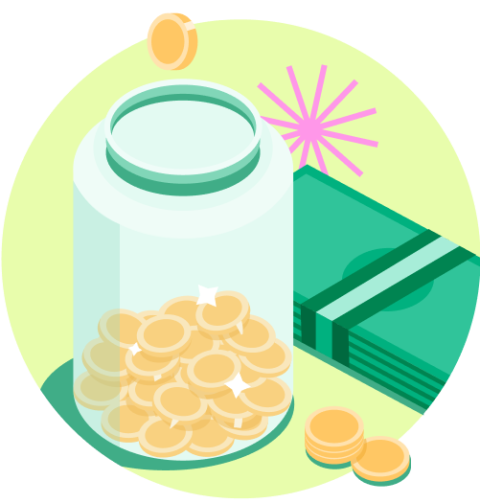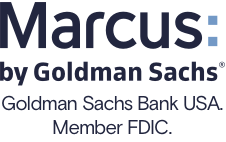How Do CDs Work? Learn How to Save Smarter

Many, or all, of the products featured on this page are from our advertising partners who compensate us when you take certain actions on our website or click to take an action on their website. However, this does not influence our evaluations. Our opinions are our own. Here is a list of our partners and here's how we make money.
How do CDs work?
A certificate of deposit is a type of savings account with a fixed interest rate and term. CDs, called share certificates at credit unions, tend to have the highest rates among federally insured bank accounts. Here’s a breakdown of various factors that make up CDs.
CD rates
Unlike regular savings accounts, most CDs earn the same rate over time. This can be a plus if you lock in a high rate, then see rates across banks fall. And it can be a negative when you’re looking at low rates that may rise soon. Rates are in terms of annual percentage yield.
» COMPARE: NerdWallet's best CD rates
CD terms
You must choose a specific time frame to open a CD. Terms generally range from three months to five years, and terms can impact both rates and early withdrawal penalties, which are fees charged if you cash out a CD before the term ends. Generally, the longer the term, the higher the rate; penalties tend to be bigger for longer terms. Consider how much time you can keep some cash locked up and learn more about short-term, midrange and long-term CDs.
High CD rates for now
CD rates have started to dip and may continue to fall, especially if the Fed decides to drop its rate. Now might be a good time to get high CD rates, if they work for your savings goals. See where rates are headed in our CD rate forecast.
CD safety
Like other bank accounts, CDs have federal deposit insurance up to $250,000 at banks insured by the Federal Deposit Insurance Corp. and at credit unions insured by the National Credit Union Administration. This means you get your money back, guaranteed, if a financial institution goes bankrupt.

A CD’s main risk is opportunity risk, meaning you may lose out on higher rates if you open a CD right before rates rise. But unlike investing in stocks or bonds, you typically don’t risk losing money from a CD based on factors outside your control, such as financial market performance. Learn more about how CDs are safe.
CD opening deposit
Your initial deposit tends to be your only time to add money into a CD. A standard CD has a minimum opening deposit that can range from $0 to $10,000. CDs with much higher minimums, such as $100,000, are typically called jumbo CDs. Be mindful that the $250,000 federally insured limit applies, and choose how much to put into CDs based on your savings goals.
CD maturity date
Unlike any other bank account, CDs mature on a specific day either months or years after you opened it. Many banks automatically renew CDs, but that might not be in your best interest since it’s better to compare rates each time you open a new CD. Consider your choices when CDs mature.
CD penalty
If you break the seal on a CD before the maturity date, you’ll likely pay a penalty worth several months to a year’s worth of interest earned. See a list of a dozen banks’ CD early withdrawal penalties.
CDs at a bank vs. credit union
These two types of banking institutions have different names for this time-based account. Banks call them CDs and the returns you earn interest. Credit unions call them share certificates (or certificates); the returns are known as dividends. This is because credit unions are not-for-profits where the account holders are owners of the credit union. That differs from banks, where account holders aren't considered owners and function more like lenders. Banks borrow account holders' money in deposit accounts such as CDs, and thus pay interest in return for the ability to use it.
Types of CDs
For the most part, you’ll consider CDs with fixed rates, no ability to add more money over time, and a penalty if you access the money before maturity. However, not all CDs have this set of traits. No-penalty CDs, for example, let you withdraw for free whenever you choose. Step-up CDs have the CD rate increase once or twice during a term. Explore these and other types of CDs.

When to get a CD
CDs can be worth it for people in specific situations, such as:
Locking up funds for a future purchase: If you have some savings dedicated to a big purchase years away, such as a car or down payment for a home, a CD can keep your money safe and out of reach until the estimated date you’ll need it.
Protecting wealth for several years: If you want to avoid the risks that come with stocks and bonds, especially if you’re close to retirement, you may decide to use long-term CDs. Your money won’t grow as much over time as in stocks, but CD returns are guaranteed and generally higher than those of other bank accounts.
Using CDs for pre-invested funds: If you’re a fan of gradually investing money and you’re sitting on a large sum of cash, you might decide to spread out when you buy stocks or mutual funds using a strategy known as dollar-cost averaging. You can put the cash you’ll eventually invest into CDs to earn more interest than if it were sitting in a regular savings account.
How to open a CD
First, choose your CD based on rate, term and type of CD. Next, choose how to apply — online, over the phone, or at a branch if applicable — and get your identification ready. Read more about the next steps to opening a CD account.
CD vs. savings account
A certificate of deposit generally keeps your money under lock and key for a fixed term and rate and you can’t make additional contributions. In exchange for losing access, CDs tend to have higher rates than other savings accounts.
A regular savings account is more flexible and lets you deposit funds at any time and withdraw money at least several times per month. For more about their differences, see our article on CDs vs. savings.
CD vs. bond
A CD is a federally insured savings account for a term usually up to five years. To withdraw early, you usually pay a penalty.
A bond is a loan to a company or the government for a term that can be as long as 30 years. Unlike most types of CDs, you must sell bonds if you need to access the money before maturity. Learn more about the difference between bonds and CDs.
Types of CD strategies
There are a few ways to get creative with your use of CDs.
A CD ladder involves dividing up an investment into several CDs of different term lengths. When each CD matures, place that money into a new long-term CD so that you take advantage of potentially higher rates offered over time. See our in-depth explainer on CD ladders.
A CD barbell can resemble a CD ladder without middle rungs. You split an investment into long-term and short-term CDs, with the goal of waiting for higher rates before putting all your money into long-term CDs.
A CD bullet strategy consists of one or multiple CDs that have around the same maturity date. The goal is to build savings for a big purchase years away, such as a down payment on a home. Learn more about all three strategies in our guide for how to invest in CDs.
What are CD rates right now?
Here’s a snapshot of national averages compared to high-yield CDs, by term, at some online banks and credit unions.
CURRENT CD RATES: 3-month | |
Popular Direct | 5.25% APY. |
Alliant Credit Union | 4.25% APY. |
EverBank (formerly TIAA Bank) | 3.95% APY. |
National average for 3-month CD | 1.53%. |
» See more best 3-month CD rates | |
CURRENT CD RATES: 6-month | |
Popular Direct | 5.35% APY. |
BMO Alto | 5.10% APY. |
Alliant Credit Union | 5.00% APY. |
National average for 6-month CD | 1.81%. |
» See more best 6-month CD rates | |
CURRENT CD RATES: 1-year | |
Popular Direct | 5.20% APY. |
BMO Alto | 5.05% APY. |
Bread Savings™ | 5.15% APY*. |
National average for 1-year CD | 1.85%. |
» See more best 1-year CD rates | |
CURRENT CD RATES: 3-year | |
Popular Direct | 4.50% APY. |
BMO Alto | 4.60% APY. |
Bread Savings™ | 4.25% APY*. |
National average for 3-year CD | 1.44%. |
» See more best 3-year CD rates | |
CURRENT CD RATES: 5-year | |
Popular Direct | 4.30% APY. |
BMO Alto | 4.75% APY. |
Bread Savings™ | 4.05% APY*. |
National average for 5-year CD | 1.43%. |
» See more best 5-year CD rates | |
“National average” refers to the Federal Deposit Insurance Corp. national averages. *Bread Savings disclosure | |
If you want a bigger picture of CD rates over the past decade, see our article on historical CD rates. Or, see predictions for where yields may be headed on our CD rate forecast.
What are promotional CD rates?
Some banks have deals on nonstandard terms such as seven-month and 15-month CDs, so you may have some luck finding higher-than-average yields for promotional CD rates.

Member FDIC
Marcus by Goldman Sachs High-Yield CD

5.10%
6 months
Bask Bank CD

5.30%
9 months

Member FDIC
Marcus by Goldman Sachs High-Yield CD

5.15%
1 year
See CD rates by term and type
Compare the best rates for various CD terms and types:
How do CDs work?
Learn more about choosing CDs, understanding CD rates, and opening and closing CDs.
Choosing CDs:










